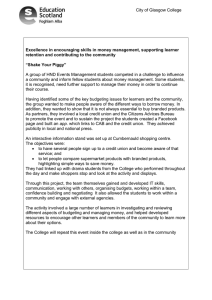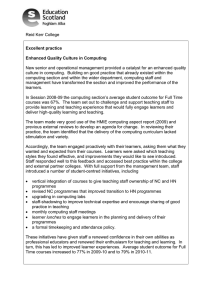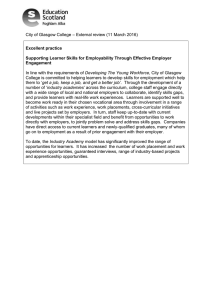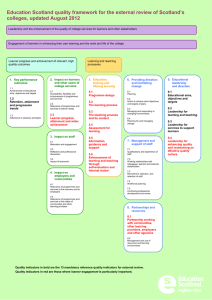Glasgow Clyde College 23 January 2015 A report by HM Inspectors
advertisement
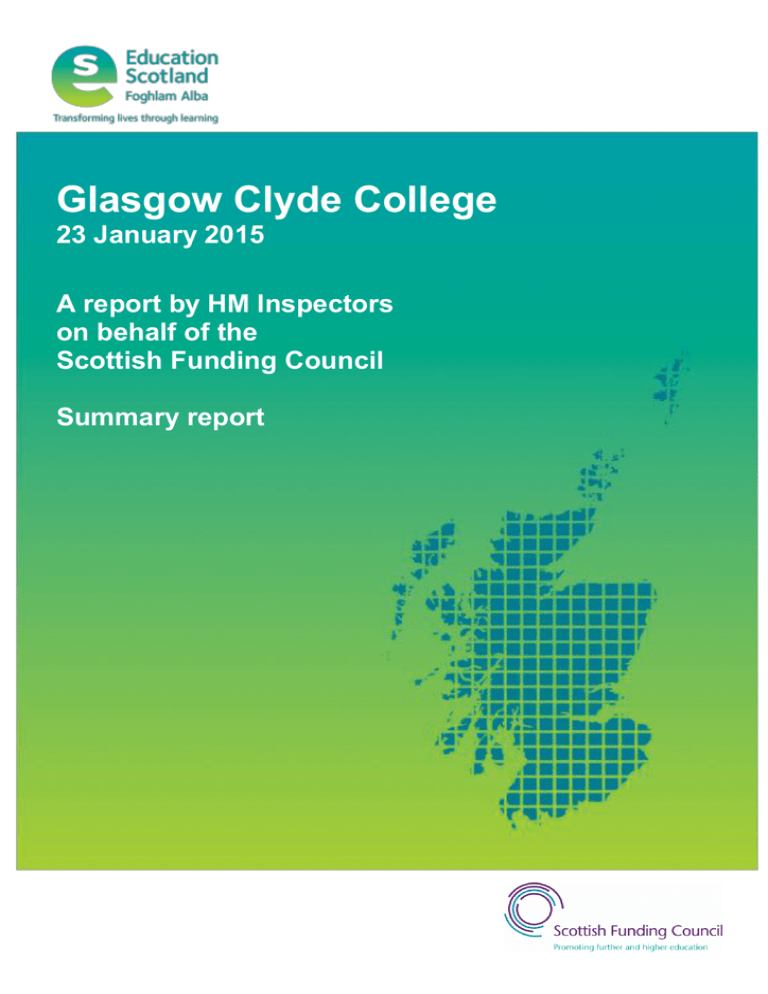
Glasgow Clyde College 23 January 2015 A report by HM Inspectors on behalf of the Scottish Funding Council Summary report The external review process HM Inspectors undertake an independent review of the quality of provision in Scotland’s colleges on behalf of the Scottish Further and Higher Education Funding Council (SFC) under a service level agreement between the council and Education Scotland. External review teams include HM Inspectors, associate assessors and a student team member. During external reviews, members of the review teams observe learning and teaching and hold discussions with learners, staff and stakeholders. They consider information on learner attainment and evaluate learner progress and outcomes. They meet with members of the Board of Management and obtain feedback from community groups, partners and employers who work with the college. The purpose of this report is to convey the main outcomes arising from the external review, to acknowledge the college’s strengths and to provide a clear agenda for future action to improve and enhance quality. This external review results in judgements of effective or limited effectiveness or not effective that express the external review team’s overall evaluation of high quality learning, learner engagement and quality culture. The report also uses the following terms to describe numbers and proportions: almost all most majority less than half few over 90% 75-90% 50-74% 15-49% up to 15% This report is Crown Copyright. You may re-use this publication (not including agency logos) free of charge in any format for research, private study or internal circulation within an organisation. You must re-use it accurately and not use it in a misleading context. The material must be acknowledged as Crown Copyright and you must give the title of the source document/publication. For any other use of this material please apply for a Click-Use Licence for core material at: www.hmso.gov.uk/copyright/licences/click-use-home.htm or by writing to: HMSO Licensing, St Clements House, 2-16 Colegate, Norwich, NR3 1BQ Fax: 01603 723000 E-mail: hmsolicensing@cabinet-office.x.gsi.gov.uk Contents Page 1. Introduction 1 The external review 1 2. The college and its context 2 3. 3 Outcomes of external review Judgement of Effectiveness Section A: Section B: Section C: Section D: Section E: Overarching judgement Supporting statements Areas of positive practice Areas for development Main points for action 3 3 5 6 6 4. Signposting excellent practice 7 5. What is an overarching judgement? 10 6. What happens next? 12 7. Further information 12 8. How can you contact us? 13 Appendices 14 Glossary of terms The Scottish Credit and Qualifications Framework 14 15 1. Introduction The external review The external review by Education Scotland took place during the week beginning 10 November 2014. We examined learning and teaching and other important activities that impact on the quality of the learner experience. We evaluated these against the three key principles of high quality learning, learner engagement and quality culture, using the 13 reference quality indicators (QI) outlined in External quality arrangements for Scotland’s colleges, updated August 2013. We also included QIs 2.2 Relevance of programmes and services to learner needs and 6.3 Managing and responding to changing environments to support our evaluations. We used information from previous visits to the college to decide the scope of the review. We found examples of excellence which we describe in this report on pages 7 to 9. The external review team talked with learners, staff at all levels in the college, members of the assigned college Board, employers, external agencies and other users of the college. 1 2. The college and its context In carrying out the external review of Glasgow Clyde College, Education Scotland took the following college context fully into account. Glasgow Clyde College came into being on 1 August 2013, as a result of the merger of Anniesland, Cardonald and Langside Colleges. It is one of three assigned colleges within Glasgow Region, the others being Glasgow Kelvin College and City of Glasgow College. The Glasgow Regional Board was established in May 2014, with the assigned college Board of Management for Glasgow Clyde College vesting in August 2014. A framework which sets out relationships and responsibilities between the Regional Board and the assigned colleges, including for allocation of funding, is currently taking shape. The Regional Outcome Agreement for 2014-15 has been drawn up by the three colleges working in partnership. To assist the Regional Board in its strategic planning, the Glasgow Colleges Strategic Partnership, comprising senior staff within the three assigned colleges and within SFC, has undertaken a range of review and planning activities. These have included detailed analysis of key industry sectors, likely future economic development and demographic factors in Glasgow, East Dunbartonshire and East Renfrewshire. Resulting proposals include re-alignment of activity levels across the colleges within the Region. Regional analysis confirms that Glasgow has the highest level of deprivation in Scotland, and there is also a high level of the adult population with low levels of qualification. Following merger, Glasgow Clyde College has restructured staff roles to take account of the new operating environment. The college has now completed a restructure of support services staff and most tiers of academic management posts are also in place. There are just over 1,000 staff in the college. There has been recent agreement on terms and conditions for academic staff, but at the time of the review, these had not been implemented. The college organises provision through five curriculum faculties which incorporate 17 curriculum schools. Almost all provision is delivered from three campuses across the South and West of Glasgow, with a small amount delivered in work-based and community settings. The college delivers programmes in almost all subject categories from level 1 to level 9 on the Scottish Credit and Qualifications Framework (SCQF). In 2013-14 the college enrolled approximately 17,300 learners with around 38% studying on a full-time basis. In the current year approximately 43% of college enrolments are learners from the 20% most deprived datazone areas. Most learners come from the Glasgow City area. A significant number also come from surrounding local authority areas, with a smaller proportion travelling from across Scotland to undertake specialist study. The college works in close partnership with a wide range of external strategic partners. These include Glasgow City, East Dunbartonshire and East Renfrewshire Councils, and an extensive range of community and employer organisations. It delivers a large number of school-college partnership programmes across the three local authorities. Glasgow Clyde College represents the Glasgow colleges on the Glasgow City Council’s Curriculum for Excellence Strategy Group. The college is contracted to deliver an overall target of approximately 166,400 wSUMs in 2014-15. The college's projected revenue budget for the period April 2014 to March 2015 is £45m of which 63% is grant-in-aid from SFC. 2 3. Outcomes of External Review Judgement of Effectiveness Section A: Overarching judgement Glasgow Clyde College has in place effective arrangements to maintain and enhance the quality of its provision and outcomes for learners and other stakeholders. This judgement means that, in relation to quality assurance and enhancement, the college is led well, has sufficiently robust arrangements to address any identified minor weaknesses, and is likely to continue to improve the quality of its services for learners and other stakeholders. Section B: Supporting statements Learner progress and outcomes In full-time and part-time Higher Education (HE) programmes, successful completion rates are higher than the national sector performance level. However, in full-time Further Education (FE) programmes successful completion rates are lower than national sector performance and in part-time FE programmes, significantly lower. The majority of learners who complete college programmes attain certificated awards. Almost all learners progress well from prior learning and are well prepared for future careers and further learning. Most learners are satisfied with college programmes and support services. Attainment of core skills is good overall across the college. Learners in many programmes also gain awards in addition to those of their main programme and enjoy success in industry competitions. The college offers a wide range of programmes which meets the needs of learners well and has an appropriate and increasing focus on the development of employability skills within its programmes. However, in a few curriculum areas, although significant numbers of learners achieve individual learning goals while studying at college, programme structure and design do not always support their successful attainment of the full programme award. Learning and teaching processes Almost all programme teams design relevant programmes which address the requirements of learners and other key stakeholders. Staff promote equality and diversity well. In almost all classes teaching staff use a wide and effective range of teaching approaches to facilitate high-quality learning. In a few classes teaching staff use delivery methods that are particularly motivational. Learner work is generally of a high quality and demonstrates a clear understanding of industry expectations and standards. Relationships between teaching staff and learners are mutually respectful and productive. However, in few programmes, learners could be 3 more effectively involved in discussing and planning the work of the class. Teaching staff plan and schedule assessment well and provide helpful feedback on assessed work. Almost all learners make good use of progress and guidance sessions with teaching staff to plan their next steps. Most programme teams engage in effective internal review of their areas of work. However, as yet, detailed analysis of programme performance has not formed a full part of the self-evaluation process for the new college. As a result, clear reasons for low performance in some subject areas over the past year have not fully translated into actions for improvement in the current year. Learner engagement The college has a clear vision of the learner role in enhancing learning. In most programmes, there are many examples of learners influencing change for the better. Class representatives do a good job of facilitating improvement by conveying learner views to staff. Most class representatives have benefited from relevant training or will shortly undertake it. There is a very well-embedded ethos of positive partnership working between Glasgow Clyde College Student Association (GCCSA) and college staff and managers. The Student Association and college managers are agreeing an approach which will help sustain the current, highly successful arrangements. The college and Student Association Respect Charter sets out clear and agreed values for all members of the college community. The learner voice is well represented on an extensive range of strategic and operational college committees. GCCSA initiatives are beginning to have a direct and positive influence on learning and teaching and on equalities. Learners are currently leading on reviewing information and communications technology (ICT) resources in one campus and on a review of the college-wide virtual learning environment (VLE). Leadership and Quality Culture The college has responded well to major, recent change. Senior managers have planned and managed merger well, though acknowledge that it will take time to establish a single culture and common working practices across all areas of its work. The college has robust systems in place to manage risk. The college’s Corporate Plan has a strong and appropriate focus on empowering learners, enhancing the quality of college provision and improving economic performance within the city. The college is led well by the principal, ably supported by an experienced and highly committed senior management team. Partnership working is a major strength of the college. Within the regional structure, the college has clear plans to enhance aspects of its current curriculum, including through its response to Developing Scotland’s Young Workforce. Many new curriculum teams are taking a positive approach to developing unified approaches to learning and teaching. Recently-appointed managers of cross-college support services are working well with their teams to devise common procedures. All college staff actively seek ways to improve provision. Although the college improved its performance overall from 2012-13 baseline figures aggregated from the three legacy colleges, there remains need for significant improvement to successful completion rates in a number of programmes, particularly in part-time FE. The college has well-advanced plans in place to support improvement in areas of low performance. 4 Section C: Areas of positive practice Early and further withdrawal rates for full-time FE, full-time HE and part-time HE programmes are either in line with or better than the national sector performance level. In full-time and part-time HE programmes, successful completion rates are above national performance. Almost all learners whose destinations are known progress to further study, apprenticeships or employment. The college offers a wide and appropriate range of programmes which address the needs of learners and stakeholders well. Several programmes successfully support learners to overcome barriers to learning and progress into employment or further training. The college has an appropriate and increasing focus on the development of employability skills within its programmes. The college delivers a large volume and wide range of school-college partnership programmes, most of which successfully introduce young learners to college study and support them to make informed choices about their careers and progression routes. Almost all learners are motivated and engaged in purposeful learning activity, working well both independently and in groups. Learners enjoy attending college and are active contributors to their own vocational and personal development. Most are on track to achieve their individual learning goals. In most programmes, learners provide regular and useful feedback to teaching staff through a range of structured and informal methods. There are many examples of learners influencing change for the better across the college. There is a very well-embedded ethos of positive partnership working between GCCSA and college managers and staff. The Student Association makes a full contribution to strategic decision-making and to college life. The learner voice is well represented on an extensive range of strategic and operational college committees. College managers and staff have responded positively to major, recent changes both within the college and the Region. Senior managers have planned and managed merger well. The college’s Corporate Plan sets out very clearly its strategic aims as a new college. These aims have a strong and appropriate focus on empowering learners, enhancing the quality of college provision and improving economic performance within the city. Partnership working is a major strength of the college. Within the regional structure, the college has a clear vision for enhancing those aspects of its curriculum which prioritise learner progression to employment or further learning. The college is responding well to the recommendations Developing Scotland’s Young Workforce. The college is led well by the principal, ably supported by an experienced and highly committed senior management team. Directors of Faculty have provided effective leadership for teaching staff throughout the period of transition. Recently-appointed Heads of Curriculum have made a good start in engaging with their greatly enlarged and dispersed departments. Recently-appointed managers of cross-college support services have also provided strong leadership for their new teams. 5 Section D: Areas for development In part-time FE programmes early and further withdrawal rates are worse than national sector performance levels. In full-time and part-time FE programmes, successful completion rates are below national sector performance level. In a few curriculum areas, although a significant number of learners achieve individual learning goals while studying at college, programme structure and design do not always support their successful attainment of the full programme award. In a few programmes, learners could be more effectively involved in discussing and planning the work of the class. As yet, detailed analysis of programme performance has not formed a full part of the self-evaluation process for the new college. As a result, clear reasons for low performance in some subject areas over the past year have not fully translated to actions for improvement in the current year. There is a need for significant improvement to successful completion rates in a number of programmes, particularly in part-time FE. Section E: Main points for action The college should improve successful completion rates in programmes where they are low, particularly in part-time FE. The college should ensure that programme structure and design always support successful attainment of the programme award. The college should improve approaches to self-evaluation in programme teams to ensure that action planning leads to improvement in performance. 6 4. Signposting excellent practice During the Education Scotland external review, the college submitted examples of what it considered to be excellent practice and the review team also identified examples worthy of dissemination. 4.1 Building a positive cross-college culture: college Festival of Sport The college took full advantage of the interest generated by the Commonwealth Games in Glasgow in 2014 to hold a three-day Glasgow Clyde College games event for learners with additional support for learning (ASL) needs. The Festival of Sport took place in May 2014 and involved ten competitive sporting events, many of which were new to the learners. A particularly notable aspect was that it involved large numbers of mainstream learners in supporting their ASL colleagues throughout the project. One hundred and eighty learners and several staff took part from across the whole college. The project offered ASL learners a challenging opportunity to organise, with support, a major and complex event. This had a highly positive impact on their skills development, self-esteem, motivation and sense of achievement. The mainstream learners who supported the event enhanced greatly their understanding of the capabilities of their colleagues. The college ensured that the event mirrored real-life practice, which provided a valuable, live learning opportunity for many learners. For example, dance learners choreographed and performed the opening ceremony, sports coaching learners helped to coach participants and manage the competitions and hospitality learners worked alongside professional catering staff. Media and journalism learners reported on the event through the college’s radio station and blogs and also recorded the event on camera. The Glasgow Clyde College Student Association supported the event and local schools were invited to view it, making it a valuable community enterprise. The Festival of Sport was highly successful, enjoyable and celebratory. The event had a particularly strong influence on building a positive cross-campus culture in the first year following merger and helped develop constructive, new relationships across the college. The event also increased awareness of health and wellbeing within the college and demonstrated well the college’s inclusive ethos. The college plans to continue this good work by holding an annual inter-campus sports event. 4.2 Enhancing employability: Additional Support Learners with additional support needs The college ASL team has developed the first Project Search initiative in Glasgow. Project Search is a franchise, originally developed in the USA. It aims to help people with ASL needs to enter full employment by providing supported employment opportunities. The project’s overall aims include increasing the very low numbers of people who require additional learning support who are currently in paid employment or workplace training. The college Project Search initiative is carried out with Glasgow’s Victoria Infirmary as the host employer. Key ingredients for success include the positive and imaginative partnerships between the college and NHS Greater Glasgow and Clyde, the City of Glasgow Supported Employment Service and Project Search advisers. The college also carried out very thorough preparation before the start of the project, which helpfully 7 identified areas of potential difficulty and resolved them at an early stage. A college lecturer and a job coach from City of Glasgow Supported Employment Service jointly undertook a two-week induction period to learn the skills required for work as porters, domestics and catering assistants. They drew on this experience to teach learners how to carry out these jobs correctly. In turn, college staff provided NHS staff with training and advice about how best to support these learners in the workplace. In 2013-14, twelve learners undertook three ten-week rotational placements in the domestic, catering and porter departments of the hospital, supported by their college lecturer, job coach and a hospital buddy. The learners gained valuable vocational skills in the three areas. They also developed confidence and a range of relevant employability skills. Ten of these learners progressed successfully to employment in the NHS. The project is in its second year, and now also involves the medical records department. The project has challenged perceptions positively amongst hospital workers about the capacity of ASL individuals to succeed in the workplace. The college is working with others in the city to extend this successful model into new areas of employment. 4.3 Enhancing employability: effective use of industry links Glasgow Clyde College uses several innovative approaches to enhancing learners’ employability skills. This reflects the college’s key strategic aims of meeting the needs of the local economy and of improving learners’ life chances. Most subject areas across the college work very well with industry partners to enhance the curriculum. Many programmes include live industry projects as part of coursework, which often involve learners working alongside industry experts. Industry specialists, including part-time college staff members, also often enhance the knowledge of learners and staff through delivering workshops. In most subject areas learners also benefit from work-placement opportunities. Certain key elements underpin the college’s successful use of industry links. For example, many programme teams ensure that opportunities for employability are planned into programmes from the start of the academic year. This is particularly prevalent in programmes at all levels in the textiles department, where teaching staff select or integrate appropriate units through which learners can carry out live industry-based projects. In HND Fashion Technology, for instance, learners studied two units, Costume Construction and Corsetry, and created Victorian costumes for the guides at Pollok House in Glasgow. This enabled learners to research an historical theme and learn traditional garment construction techniques, while also meeting stringent client requirements. While planning ahead can be beneficial, other successful employability projects have required high levels of creative thinking, responsiveness and agility within programme teams. These projects depend on a readiness to capitalise on opportunities as they arise and team capacity to plan quickly and collaboratively. All of this reflects real business practice. A good example is the recent Glasgow Commonwealth Games and the Host Broadcaster Training Initiative in which learners on the HND Creative Industries: Television programme worked alongside professional broadcasters in a high-profile sports event. This improved learners’ professional skills, which greatly enhanced their prospects for employment or further study. 8 A further element of success involves developing and sustaining mutually beneficial partnerships. Managers and staff in many programmes proactively seek out projects which address both college and partner aims, while enriching the curriculum. This enables the college and its partners to make imaginative use of shared expertise, resources and funding. A good example of this is the Governments Cashback for Communities initiative and its financial support for the college’s award-winning Powerskills programme. In this project, the college’s Faculty of Engineering and Built Environment works with closely with Scottish Power. As a result, several young people who had disengaged from education have taken part successfully in six-month introductory engineering programmes. The college has developed a highly-effective operating model from this venture and is extending it to other subject areas. All learners who undertake employability projects benefit greatly from the experience. These projects also help college staff to enhance and update their knowledge of the workplace. As the new college becomes fully established, further innovative approaches to industry links are being identified, developed and shared across the college. 9 5. What is an overarching judgement? Education Scotland uses an overarching judgement of Effectiveness to express the findings of the review team. The judgement of effectiveness takes into account all the evidence gathered through the external review. Such judgements express outcomes as: effective; limited effectiveness; or not effective. This judgement is further detailed by supporting statements which substantiate the judgement of effectiveness. Education Scotland evaluates and reports according to the three key principles. In this report, the principles and supporting statements relate to: Key principle 1 – High quality learning (supporting statements numbers 1 and 2) Key principle 2 – Learner engagement (supporting statement number 3) Key principle 3 – Quality culture (supporting statement number 4) Judgements of effectiveness and supporting statements provide stakeholders with assurances, or otherwise, about the quality of a college’s provision. These judgements are based on trends and track record of a college, the findings at the time of the external review, and the college’s capacity to continue improving. A judgement of effective indicates that the college has in place effective arrangements to maintain and enhance the quality of its provision and outcomes for learners and other stakeholders. This judgement means that, in relation to quality assurance and enhancement, the college is led well, has sufficiently robust arrangements to address any minor weakness, and is likely to continue to improve the quality of its services for learners and other stakeholders. A judgement of limited effectiveness indicates that the effectiveness of the college’s arrangements to maintain and enhance the quality of its provision and outcomes for learners and other stakeholders is limited. This judgement means that there are some strengths in the college’s arrangements for quality enhancement. However, there are weaknesses in arrangements for high quality learning and/or learner engagement and/or quality culture. If not addressed, the importance of these weaknesses will continue to limit the effectiveness of the college’s arrangements. A judgement of not effective indicates that the college’s arrangements to maintain and enhance the quality of its provision and outcomes for learners and other stakeholders are not effective. This judgement means that there are significant weaknesses in the arrangements for high quality learning and/or learner engagement and/or quality culture. There is a high probability that, without significant and comprehensive action, with external monitoring and support, the college will fail to improve current low-quality provision and outcomes to an acceptable level. Education Scotland does not have evidence that the college has the capacity and commitment to identify and implement effective and comprehensive action. 10 Scottish Funding Council response to judgements If the overarching judgement is effective, the Council will expect the college to engage with Education Scotland in follow-up activity, as appropriate, and, one year after the publication of the review reports, to provide a report, endorsed by its governing body (see Council guidance to colleges on quality from August 2012, paragraphs 62-66 SFC/13/2012 setting out its response to the review.) If the overarching judgement is of limited effectiveness or is not effective, the Council will require the institution to prepare and fulfil an action plan to address the shortcomings identified (see paragraph 67 of guidance). Education Scotland will provide advice to SFC on the adequacy of the action plan and on how it is being implemented. SFC, taking into account any advice from Education Scotland, will normally require a formal follow-up review at an appropriate time, usually within no more than two years. 11 6. What happens next? Education Scotland will continue to monitor progress during annual engagement visits to the college. There will be feedback to the learners at the college. One year on from this report, the college will produce a report setting out what it has done to address the main points for action and/or areas for development in the report and other quality assurance and enhancement activities. There will be a link to this report from Education Scotland’s website. Sheila Page HM Inspector 7. Further information The review and judgements relate to the college as a whole and do not provide information about individual programmes of study or subjects. For further information on these or any other queries, contact the college or look on its website http://www.glasgowclyde.ac.uk/ For further information about Education Scotland, the external review methodologies, or other information about reviews, see www.educationscotland.gov.uk For further information about the Scottish Funding Council, see www.sfc.ac.uk 12 8. How can you contact us? This report has been produced as a web-only publication and is available on our website at http://www.educationscotland.gov.uk/inspectionandreview/reports/othersectors/collegere views/GlasgowClydeCollege.asp If you would like to receive this report in a different format, for example, in a translation please contact the administration team on 01506 600381. If you want to give us feedback or make a complaint about our work, please contact us by telephone on 0141 282 5000, or e-mail: complaints@educationscotland.gsi.gov.uk or write to us addressing your letter to The Complaints Manager, Denholm House, Almondvale Business Park, Livingston, EH54 6GA. Text phone users can contact us on 01506 600236. This is a service for deaf users. Please do not use this number for voice calls as the line will not connect you to a member of staff. Readability Survey Alternatively if you are reading this report in hard copy please type the following address into your web browser. http://www.educationscotland.gov.uk/Images/FEReadabilitysurvey130612_tcm4719342.doc Crown Copyright 2015 Education Scotland 13 Appendix 1 Glossary of terms ASL FE GCCSA HE HNC HND ICT NHS QI SCQF SFC VLE wSUM Additional support for learning Further education Glasgow Clyde college Student Association Higher education Higher National Certificate Higher National Diploma Information and communications technology National Health Service Quality indicator Scottish Credit and Qualifications Framework Scottish Funding Council Virtual learning environment Student unit of measurement 14 Appendix 2 15
